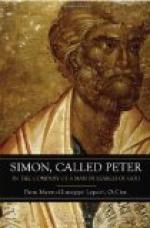“Annie said, this morning, that she heard everyone in the streets last night say we must fight, father,” put in Hilda.
“Pooh!” exclaimed the city personage, touched now on the raw. “What do the fools know about it? I suppose the Daily Mail will scream, but, thank God, this country has not quite gone to the dogs yet. The people, indeed! The mass of the country is solid for sense and business, and trusts the Government. Of course, the Tory press will make the whole question a party lever if it can, but it can’t. What! Are we going to be pushed into war by a mob and a few journalists? Why, Labour even will be dead against it. Come, Graham, you ought to know something about that. More in your line than mine—don’t you think so?”
“You really ought not to let the maids talk so,” said Mrs. Lessing gently.
Peter glanced at her with a curiously hopeless feeling, and looked slowly round the room until his eyes rested on Mr. Lessing’s portrait over the mantelshelf, presented by the congregation of St. John’s on some occasion two years before. From the portrait he turned to the gentleman, but it was not necessary for him to speak. Mr. Lessing was saying something to the man—probably ordering the car. He glanced across at Hilda, who had made some reply to her mother and was toying with a spoon. He thought he had never seen her look more handsome and.... He could not find the word: thought of “solid,” and then smiled at the thought. It did not fit in with the sunlight on her hair.
“Well, well,” said Mr. Lessing; “we ought to make a move. It won’t do for either of us to be late, Mr. Preacher.”
The congregation of St. John’s assembled on a Sunday morning as befitted its importance and dignity. Families arrived, or arrived by two or three representatives, and proceeded with due solemnity to their private pews. No one, of course, exchanged greetings on the way up the church, but every lady became aware, not only of the other ladies present, but of what each wore. A sidesman, with an air of portentous gravity, as one who, in opening doors, performed an office more on behalf of the Deity than the worshippers, was usually at hand to usher the party in. Once there, there was some stir of orderly bustle: kneelers were distributed according to requirements, books sorted out after the solemn unlocking of the little box that contained them, sticks and hats safely stowed away. These duties performed, paterfamilias cast one penetrating glance round the church, and leaned gracefully forward with a kind of circular motion. Having suitably addressed Almighty God (it is to be supposed), he would lean back, adjust his trousers, possibly place an elbow on the pew-door, and contemplate with a fixed and determined gaze the distant altar.




